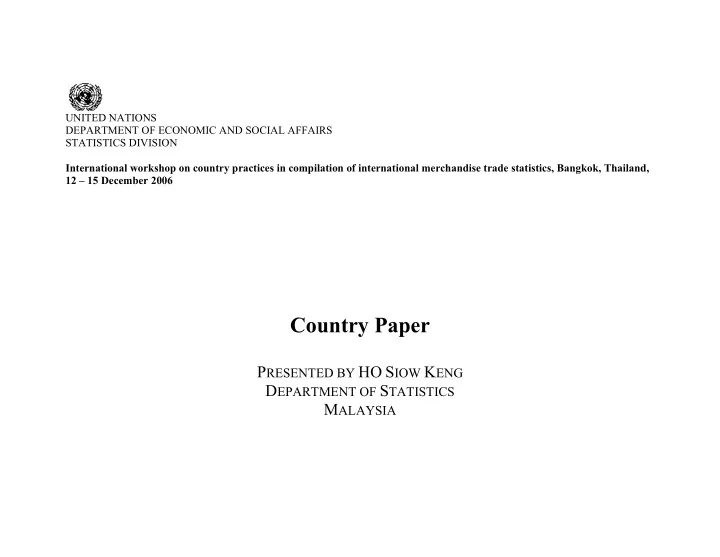

UNITED NATIONS DEPARTMENT OF ECONOMIC AND SOCIAL AFFAIRS STATISTICS DIVISION International workshop on country practices in compilation of international merchandise trade statistics, Bangkok, Thailand, 12 – 15 December 2006 Country Paper P RESENTED BY HO S IOW K ENG D EPARTMENT OF S TATISTICS M ALAYSIA
COVERAGE AND TIME SECTION 3 – OF RECORDING GOODS FOR PROCESSING THE DEPARTMENT OF STATISTICS MALAYSIA
INTRODUCTION • Department of Statistics Malaysia : sole agency that collects, compiles and publishes External Trade Statistics for Malaysia. • Conducted by External Trade Statistics Division (ETSD). – process source documents – publish trade statistics (monthly/annually) and trade indices (monthly) – supply trade data (users/subscribers) 2
SYSTEM OF RECORDING • Malaysia is adopting the ‘general’ system in compiling the external trade statistics. • National boundary of the country is used as the statistical frontier. – All goods entering or leaving the country are recorded. – Accordingly, goods entering or leaving customs bonded warehouses, Free Trade Zone and Free Zones are recorded in statistics • Time of recording – TIME OF RELEASE (approval) 3
DEFINITION • IMPORTS – Goods that are brought into the country either directly or into bonded warehouses • EXPORTS – Goods that are taken out of the country • RE-EXPORTS – Goods that taken out of the country in the same form as they were imported without any transformation 4
CUSTOMS PROCEDURES RELEVANT TO TRADE STATISTICS • All procedures under the Kyoto Convention are included • Additional procedures – Barter trade – Goods on lease (financial lease) – Duty-free shop – Humanitarian aid – Capital investment goods (equipment and material) 5
CUSTOMS PROCEDURES AND KIND OF PROCESSING KIND OF PROCESSING 4.02 Importation of goods under • Manufacturing clearance for home use 4.03 Re-importation of goods in the • Returned goods • Repairing same state • Overhauling • Manufacturing 4.04 Exportation of domestic goods (outright exportation) 6
CUSTOMS PROCEDURES AND KIND OF PROCESSING KIND OF PROCESSING • Breaking bulk 4.05 Temporary admission of goods • Consolidation subject to re-exportation in the • Grading same state (FCZ) • Repacking VA 4.06 Re-exportation of goods in the • Labeling same state (FCZ) • Storing • Trading • Distributing 4.07 Temporary admission of goods • Manufacturing for inward processing • Repairing 4.08 Goods leaving the country after • Overhauling inward processing VA – Value added activity 7
CUSTOMS PROCEDURES AND KIND OF PROCESSING KIND OF PROCESSING 4.09 Temporary exportation of • Manufacturing goods for outward processing • Repairing 4.10 Reimportation of goods after • Overhaul temporary exportation for outward processing 4.11 Goods admitted into OR • Breaking bulk • Consolidation 4.12 leaving a customs warehouse? • Grading VA • Repacking • Labeling • Storing • Trading • Distributing 8
CUSTOMS PROCEDURES AND KIND OF PROCESSING KIND OF PROCESSING • Breaking bulk 4.13 Goods admitted into OR • Consolidation 4.14 leaving a commercial free • Grading zone (zones where only • Repacking minimal repackaging and VA • Labeling similar processing of goods • Storing is allowed) ? • Trading • Distributing 4.15 Goods admitted into OR • Manufacturing 4.16 leaving an industrial free zone (zones where specific processing or manufacturing of goods is allowed) ? 4.17 Goods in customs transit? • Manufacturing 9
SOURCE OF DATA • Custom Declaration Form (K1, K2, K8) • Free Zone (ZB1 and ZB2) • Duty Free Shop (KBC 1,3,4,6 and KBC/JP1) • Postal (R & P 40, 41, 42 and 43) • Bunker Fuel dan Ballast (Petronas / Port Operators) • Courier ( Pre-alert manifest ) • Railway (KTM/JP1 and KTM/JP2) • Electricity (TNB/JP1 and TNB/JP2) • Water (Exports and Imports) 10
COMMON PRACTICES • COO changes to origin Malaysia – Based on TRANSFORMATION of goods • Valuation of the goods – GROSS basis • Link between goods being imported for processing and good being exported after processing – NOT clear • Ownership of the goods – NOT registered, o nly consignee or consignor were declared in the custom form 11
THANK YOU TERIMA KASIH
Recommend
More recommend